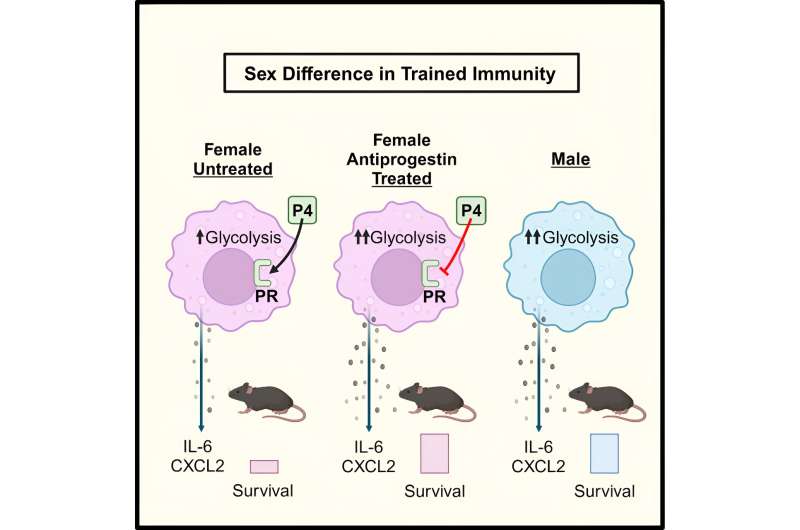Researchers find male and female immune systems get trained differently in response to infections

The human immune system is adaptive, remembering past infections and training itself to guard against future similar infections. But what happens when people have compromised immune systems due to chronic conditions, aging, or medications that decrease immunity as a side effect? In such cases, people can get opportunistic infections, so called because the germs causing illness would have been eradicated by a fully healthy immune system.
Conditions and medicines causing immune suppression are on the rise, and so are patients experiencing opportunistic infection. Now, researchers from the University of Missouri School of Medicine have uncovered a sex-based variance in the trained immune memory response to infection in mice that might translate to humans.
The researchers found that female mice were more vulnerable to opportunistic infection from a bacterial pathogen to which they had previously been exposed when progesterone levels were naturally elevated as part of their reproductive cycle. Their study is published in the journal Cell Reports.
“Differences in immune response in males and females have been observed before. For instance, males had increased morbidity and severity of COVID-19 from SARS-CoV-2 infections,” said Dr. Adam Schrum, associate professor in the Department of Molecular Microbiology and Immunology. “But females are known to suffer other infections worse than males. Our research found that female mice were far more vulnerable to opportunistic bacterial infection than male mice because of a sex-based difference in their trained immunity.”
To understand why the immune systems of female and male mice responded differently to a bacterial pathogen, the researchers examined whether the reproductive cycle affected immune training. They found that elevated progesterone levels correlated with lower trained immune responses. To test this more fully, the researchers gave the female mice progesterone blockers and found that their trained immune response was subsequently enhanced.
“The female mice had significantly restored trained immune response when progesterone was blocked, reaching comparable levels to those of male mice,” said Schrum. “Sex hormone-based modulation of immune function needs more study to be fully understood, but as a first step we can conclude that immune training is influenced by a progesterone-dependent mechanism that results in a sex bias in mice.”
In addition to further study to understand how and why progesterone specifically influences trained immune responses in mice, the researchers pointed out that because mice have shorter estrous cycles than the human menstrual cycle, further research is needed to understand how sex hormones might affect human immune training.
More information:
Alexander P. Earhart et al, Lower female survival from an opportunistic infection reveals progesterone-driven sex bias in trained immunity, Cell Reports (2023). DOI: 10.1016/j.celrep.2023.113007
Journal information:
Cell Reports
Source: Read Full Article
